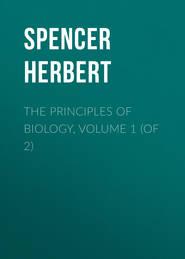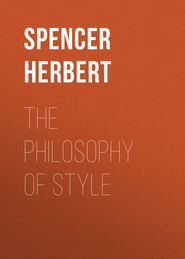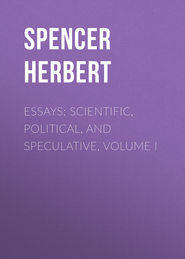По всем вопросам обращайтесь на: info@litportal.ru
(©) 2003-2024.
✖
The Data of Ethics
Настройки чтения
Размер шрифта
Высота строк
Поля
In the second place, ideal conduct such as ethical theory is concerned with, is not possible for the ideal man in the midst of men otherwise constituted. An absolutely just or perfectly sympathetic person, could not live and act according to his nature in a tribe of cannibals. Among people who are treacherous and utterly without scruple, entire truthfulness and openness must bring ruin. If all around recognize only the law of the strongest, one whose nature will not allow him to inflict pain on others, must go to the wall, There requires a certain congruity between the conduct of each member of a society and other's conduct. A mode of action entirely alien to the prevailing modes of action cannot be successfully persisted in – must eventuate in death of self, or posterity, or both.
Hence it is manifest that we must consider the ideal man as existing in the ideal social state. On the evolution hypothesis, the two presuppose one another; and only when they co-exist can there exist that ideal conduct which Absolute Ethics has to formulate, and which Relative Ethics has to take as the standard by which to estimate divergencies from right, or degrees of wrong.
CHAPTER XVI.
THE SCOPE OF ETHICS
§ 107. At the outset it was shown that as the conduct with which Ethics deals is a part of conduct at large, conduct at large must be understood before this part can be understood. After taking a general view of conduct, not human only but sub-human, and not only as existing but as evolving, we saw that Ethics has for its subject-matter the most highly-evolved conduct as displayed by the most highly-evolved being, Man – is a specification of those traits which his conduct assumes on reaching its limit of evolution. Conceived thus as comprehending the laws of right living at large, Ethics has a wider field than is commonly assigned to it. Beyond the conduct commonly approved or reprobated as right or wrong, it includes all conduct which furthers or hinders, in either direct or indirect ways, the welfare of self or others.
As foregoing chapters in various places imply, the entire field of Ethics includes the two great divisions, personal and social. There is a class of actions directed to personal ends, which are to be judged in their relations to personal well-being, considered apart from the well-being of others: though they secondarily affect fellow-men these primarily affect the agent himself, and must be classed as intrinsically right or wrong according to their beneficial or detrimental effects on him. There are actions of another class which affect fellow-men immediately and remotely, and which, though their results to self are not to be ignored, must be judged as good or bad mainly by their results to others. Actions of this last class fall into two groups. Those of the one group achieve ends in ways that do or do not unduly interfere with the pursuit of ends by others – actions which, because of this difference, we call respectively unjust or just. Those forming the other group are of a kind which influence the states of others without directly interfering with the relations between their labors and the results, in one way or the other – actions which we speak of as beneficent or maleficent. And the conduct which we regard as beneficent is itself subdivisible according as it shows us a self-repression to avoid giving pain, or an expenditure of effort to give pleasure – negative beneficence and positive beneficence.
Each of these divisions and sub-divisions has to be considered first as a part of Absolute Ethics and then as a part of Relative Ethics. Having seen what its injunctions must be for the ideal man under the implied ideal conditions, we shall be prepared to see how such injunctions are to be most nearly fulfilled by actual men under existing conditions.
§ 108. For reasons already pointed out, a code of perfect personal conduct can never be made definite. Many forms of life, diverging from one another in considerable degrees, may be so carried on in society as entirely to fulfill the conditions to harmonious co-operation. And if various types of men, adapted to various types of activities, may thus lead lives that are severally complete after their kinds, no specific statement of the activities universally required for personal well-being is possible.
But, though, the particular requirements to be fulfilled for perfect individual well-being, must vary along with variations in the material conditions of each society, certain general requirements have to be fulfilled by the individuals of all societies. An average balance between waste and nutrition has universally to be preserved. Normal vitality implies a relation between activity and rest falling within moderate limits of variation. Continuance of the society depends on satisfaction of those primarily personal needs which result in marriage and parenthood. Perfection of individual life hence implies certain modes of action which are approximately alike in all cases, and which, therefore, become part of the subject matter of Ethics.
That it is possible to reduce even this restricted part to scientific definiteness, can scarcely be said. But ethical requirements may here be to such extent affiliated upon physical necessities, as to give them a partially scientific authority. It is clear that between the expenditure of bodily substance in vital activities, and the taking in of materials from which this substance may be renewed, there is a direct relation. It is clear, too, that there is a direct relation between the wasting of tissue by effort, and the need for those cessations of effort during which repair may overtake waste. Nor is it less clear that between the rate of mortality and the rate of multiplication in any society, there is a relation such that the last must reach a certain level before it can balance the first, and prevent disappearance of the society. And it may be inferred that pursuits of other leading ends are, in like manner, determined by certain natural necessities, and from these derive their ethical sanctions. That it will ever be practicable to lay down precise rules for private conduct in conformity with such requirements, may be doubted. But the function of Absolute Ethics in relation to private conduct will have been discharged when it has produced the warrant for its requirements as generally expressed; when it has shown the imperativeness of obedience to them; and when it has thus taught the need for deliberately considering whether the conduct fulfills them as well may be.
Under the ethics of personal considered in relation to existing conditions, have to come all questions concerning the degree in which immediate personal welfare has to be postponed, either to ultimate personal welfare or to the welfare of others. As now carried on, life hourly sets the claims of present self against the claims of future self, and hourly brings individual interests face to face with the interests of other individuals, taken singly or as associated. In many of such cases the decisions can be nothing more than compromises; and ethical science, here necessarily empirical, can do no more than aid in making compromises that are the least objectionable. To arrive at the best compromise in any case, implies correct conceptions of the alternative results of this or that course. And, consequently in so far as the absolute ethics of individual conduct can be made definite, it must help us to decide between conflicting personal requirements, and also between the needs for asserting self and the needs for subordinating self.
§ 109. From that division of Ethics which deals with the right regulation of private conduct, considered apart from the effects directly produced on others, we pass now to that division of Ethics which, considering exclusively the effects of conduct on others, treats of the right regulation of it with a view to such effects.
The first set of regulations coming under this head are those concerning what we distinguish as justice. Individual life is possible only on condition that each organ is paid for its action by an equivalent of blood, while the organism as a whole obtains from the environment assimilable matters that compensate for its efforts; and the mutual dependence of parts in the social organism, necessitates that, alike for its total life and the lives of its units, there similarly shall be maintained a due proportion between returns and labors: the natural relation between work and welfare shall be preserved intact. Justice, which formulates the range of conduct and limitations to conduct hence arising, is at once the most important division of Ethics and the division which admits of the greatest definiteness. That principle of equivalence which meets us when we seek its roots in the laws of individual life, involves the idea of measure; and on passing to social life, the same principle introduces us to the conception of equity or equalness, in the relations of citizens to one another: the elements of the questions arising are quantitative, and hence the solutions assume a more scientific form. Though, having to recognize differences among individuals due to age, sex, or other cause, we cannot regard the members of a society as absolutely equal, and therefore cannot deal with problems growing out of their relations with that precision which absolute equality might make possible; yet, considering them as approximately equal in virtue of their common human nature, and dealing with questions of equity on this supposition, we may reach conclusions of a sufficiently definite kind.
This division of Ethics considered under its absolute form, has to define the equitable relations among perfect individuals who limit one another's spheres of action by co-existing, and who achieve their ends by co-operation. It has to do much more than this. Beyond justice between man and man, justice between each man and the aggregate of men has to be dealt with by it. The relations between the individual and the State, considered as representing all individuals, have to be deduced – an important and a relatively difficult matter. What is the ethical warrant for governmental authority? To what ends may it be legitimately exercised? How far may it rightly be carried? Up to what point is the citizen bound to recognize the collective decisions of other citizens, and beyond what point may he properly refuse to obey them?
These relations, private and public, considered as maintained under ideal conditions, having been formulated, there come to be dealt with the analogous relations under real conditions – absolute justice being the standard, relative justice has to be determined by considering how near an approach may, under present circumstances, be made to it. As already implied in various places, it is impossible during stages of transition which necessitate ever changing compromises, to fulfill the dictates of absolute equity; and nothing beyond empirical judgments can be formed of the extent to which they may be, at any given time, fulfilled. While war continues and injustice is done between societies, there cannot be anything like complete justice within each society. Militant organization no less than militant action, is irreconcilable with pure equity; and the inequity implied by it inevitably ramifies throughout all social relations. But there is at every stage in social evolution, a certain range of variation within which it is possible to approach nearer to, or diverge further from, the requirements of absolute equity. Hence these requirements have ever to be kept in view that relative equity may be ascertained.
§ 110. Of the two subdivisions into which beneficence falls, the negative and the positive, neither can be specialized. Under ideal conditions the first of them has but a nominal existence; and the second of them passes largely into a transfigured form admitting of but general definition.
In the conduct of the ideal man among ideal men, that self-regulation which has for its motive to avoid giving pain, practically disappears. No one having feelings which prompt acts that disagreeably affect others, there can exist no code of restraints referring to this division of conduct.
But though negative beneficence is only a nominal part of Absolute Ethics, it is an actual and considerable part of Relative Ethics. For while men's natures remain imperfectly adapted to social life, there must continue in them impulses which, causing in some cases the actions we name unjust, cause in other cases the actions we name unkind – unkind now in deed and now in word; and in respect of these modes of behavior which, though not aggressive, give pain, there arise numerous and complicated problems. Pain is sometimes given to others simply by maintaining an equitable claim; pain is at other times given by refusing a request; and again at other times by maintaining an opinion. In these and numerous cases suggested by them, there have to be answered the questions whether, to avoid inflicting pain, personal feelings should be sacrificed, and how far sacrificed. Again, in cases of another class, pain is given not by a passive course, but by an active course. How far shall a person who has misbehaved be grieved by showing aversion to him? Shall one whose action is to be reprobated have the reprobation expressed to him or shall nothing be said? Is it right to annoy by condemning a prejudice which another displays? These and kindred queries have to be answered after taking into account the immediate pain given, the possible benefit caused by giving it, and the possible evil caused by not giving it. In solving problems of this class, the only help Absolute Ethics gives, is by enforcing the consideration that inflicting more pain than is necessitated by proper self-regard, or by desire for another's benefit, or by the maintenance of a general principle is unwarranted.
Of positive beneficence under its absolute form nothing more specific can be said than that it must become co-extensive with whatever sphere remains for it; aiding to complete the life of each as a recipient of services and to exalt the life of each as a renderer of services. As with a developed humanity the desire for it by every one will so increase, and the sphere for exercise of it so decrease, as to involve an altruistic competition, analogous to the existing egoistic competition, it may be that Absolute Ethics will eventually include what we before called a higher equity, prescribing the mutual limitations of altruistic activities.
Under its relative form, positive beneficence presents numerous problems, alike important and difficult, admitting only of empirical solutions. How far is self-sacrifice for another's benefit to be carried in each case? – a question which must be answered differently according to the character of the other, the needs of the other, and the various claims of self and belongings which have to be met. To what extent under given circumstances shall private welfare be subordinated to public welfare? – a question to be answered after considering the importance of the end and the seriousness of the sacrifice. What benefit and what detriment will result from gratuitous aid yielded to another? – a question in each case implying an estimate of probabilities. Is there any unfair treatment of sundry others, involved by more than fair treatment of this one other? Up to what limit may help be given to the existing generation of the inferior, without entailing mischief on future generations of the superior? Evidently to these and many kindred questions included in this division of Relative Ethics, approximately true answers only can be given.
But though here Absolute Ethics, by the standard it supplies, does not greatly aid Relative Ethics, yet, as in other cases, it aids somewhat by keeping before consciousness an ideal conciliation of the various claims involved; and by suggesting the search for such compromise among them, as shall not disregard any, but shall satisfy all to the greatest extent practicable.
notes
1
Leviathan, ch. xv.
2
I can count up more than a dozen such cases among those personally well known to me.
3
Constitutional Code, chap. xvi, Supreme Legislative – Section vi. Omnicompetence.
4
Republic, Bk. ix.
5
Nicomachean Ethics, Bk. i, chap 8.
6
Bk. x, chap. 7.
7
This universal requirement it was which I had in view when choosing for my first work, published in 1850, the title Social Statics.
8
On Idiocy and Imbecility, by William W. Ireland, M. D., p. 255–6.
9
For instances see Fortnightly Review, Vol. XXIV (New Series), p. 712.
10
See Essay on "The Origin and Function of Music."
11
I do not find this passage in the second edition; but the omission of it appears to have arisen not from any change of view, but because it did not naturally come into the recast form of the argument which the section contains.
12
Most of these quotations I make from Dr. Bain's Mental and Moral Science.











